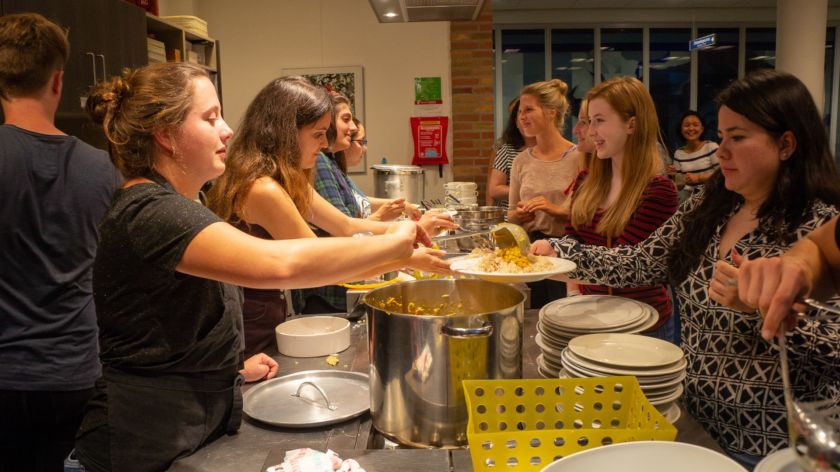Student and lonely (6): ‘Students have options to fight loneliness’
-
 International students meet at this academic year’s first Meet and Eat. Photo: Robin Jacobi
International students meet at this academic year’s first Meet and Eat. Photo: Robin Jacobi
One of the biggest problems in modern student life is loneliness, also for internationals. Vox interviewed students about this, and is now talking to people who try to help out. ‘Students have options. But they have to know where to find them.’
‘As a university, we need to create a feeling of home for internationals, and that is not that simple.’ John Hacking, the university chaplain, is sitting in the big chaplaincy garden, drinking coffee. He says that loneliness is a problem that affects the whole university community. ‘Ten years ago, my former colleague Theo Koster already said that students are more lonely than the elderly.’
‘We are probably not going to solve the problem of loneliness completely, but I think we have a social duty to try,’ says Hacking. He thinks that when you come from a different culture, it can be hard to fit in here.
‘Sometimes, students just want some support from people who are more familiar to them’
‘I once met an African student who studied to be a priest, and he told me that at home, he is never alone for longer than six or seven hours,’ he says. ‘Here, we are very individualistic as a society. On top of that, it is very important for most students to strive for excellence.’ The combination of those two things can make it hard for people to share what they go through.
Self-research
At the student chaplaincy, Hacking tries to create a place for students to wind down. ‘Every Wednesday, we have an event here called Meet and eat. People from all nationalities can come together there and talk about their experiences here, or just hang out.’ Another option for them is self-research, where students can find out what is important to them and what choices they want to make. They can also come and hang out without their books, iPhone or laptop. ‘You can leave them in a locker and actually do nothing for a while.’

What can be improved, according to Hacking, is the contact between students of the same nationality. ‘The university is very focused on encouraging contact between different nationalities. That is a good thing, but sometimes, students just want some support from people who are more familiar to them,’ he says.
Right now, Hacking has a plan to organise a Radboud International Night, together with ISN and the international office, after orientation. There, students can meet people from the same country. ‘There are options. But students have to know where to find them.’
The problem has a psychological side, Hacking says, but it is not necessarily a psychological issue. ‘When students have to go to the student psychologist, we are already quite late,’ he says. ‘It makes no sense to throw everything on the psychologists’ plate. The university has a role in this.’
Social activities
At the student psychologists’ office, there is definitely attention for this issue, says Kim van der Gronden, who works there. ‘Everybody has been trained to do their work in English as well as Dutch, and many group sessions are available in English as well.’ For example, students can go to mindfulness or stress management training.
‘There are differences between the problems Dutch and international students face’
There are similarities between the problems Dutch students face and the ones internationals face, Van der Gronden says. ‘But there are differences as well. The study pressure in the Netherlands is often experienced as high by international students, and often they also have to pay quite some money to get here.’ Because of this, the students who come to Van den Gronden, often find it hard to make time for social activities.
‘Ideally, we want students to solve the problem of loneliness by talking to each other,’ she says. ‘But some students also feel like it is hard to talk about it with their peers, because of shame. And when it leads to more complex mental issues, we can help.’



